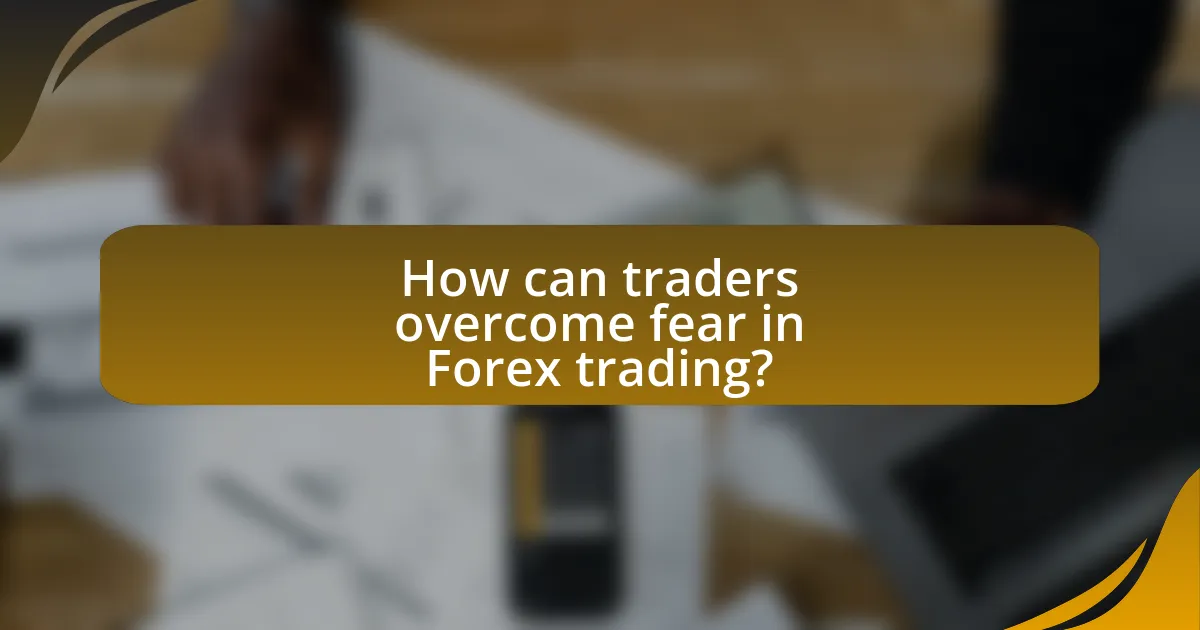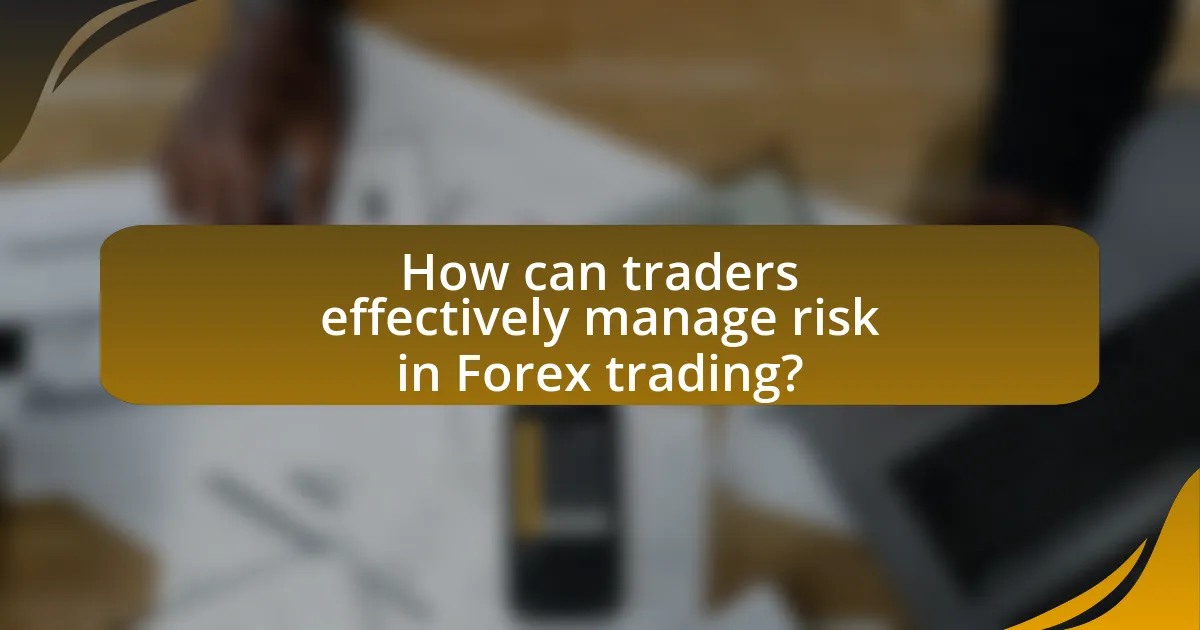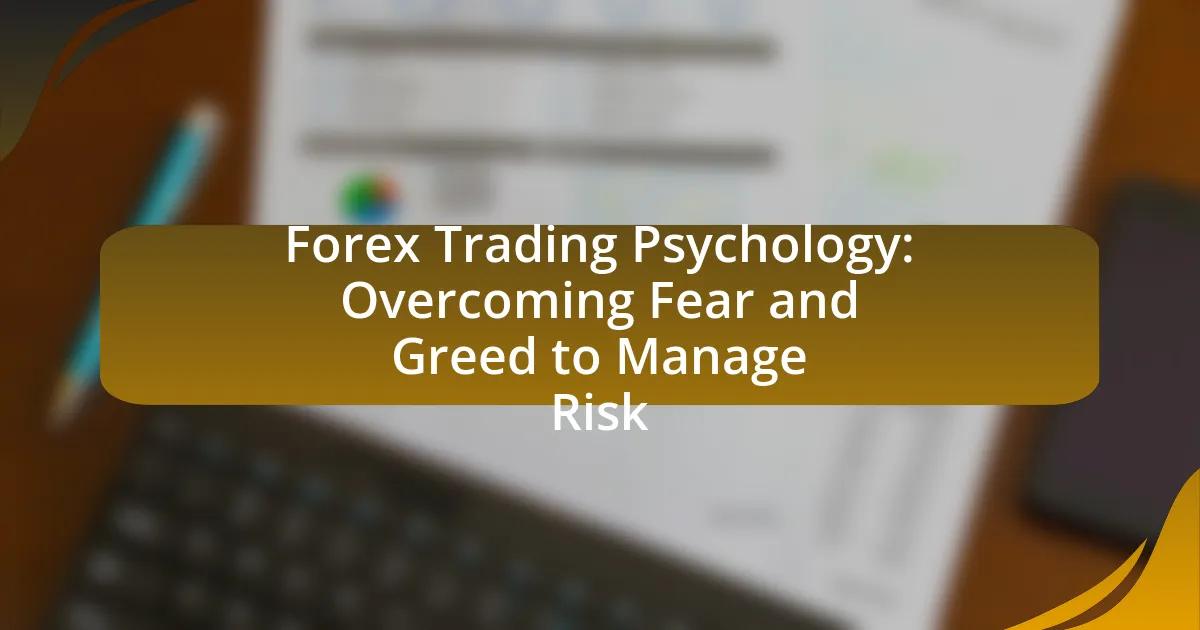Forex trading psychology encompasses the emotional and mental factors that influence traders’ decisions in the foreign exchange market, particularly focusing on fear and greed. Understanding these psychological elements is crucial for effective risk management, as they can lead to impulsive behaviors and poor decision-making. Key psychological factors include fear of loss, greed for profit, overconfidence, and loss aversion, all of which can significantly impact trading performance. The article explores strategies to manage these emotions, such as developing a structured trading plan, practicing risk management, and employing mindfulness techniques, ultimately aiming to enhance traders’ emotional resilience and decision-making capabilities.

What is Forex Trading Psychology?
Forex trading psychology refers to the emotional and mental aspects that influence a trader’s decisions in the foreign exchange market. This psychological framework encompasses factors such as fear, greed, discipline, and emotional resilience, which can significantly impact trading performance. Research indicates that traders who understand and manage their psychological biases are more likely to make rational decisions, thereby reducing the likelihood of emotional trading mistakes. For instance, a study published in the Journal of Behavioral Finance highlights that emotional responses can lead to poor risk management and increased losses, underscoring the importance of psychological awareness in successful trading strategies.
How does psychology influence trading decisions in Forex?
Psychology significantly influences trading decisions in Forex by affecting traders’ emotions, risk tolerance, and decision-making processes. Emotional factors such as fear and greed can lead to impulsive trading behaviors, resulting in poor decision-making and increased risk exposure. For instance, fear of loss may cause traders to exit positions prematurely, while greed can lead to over-leveraging and holding onto losing trades longer than advisable. Research indicates that cognitive biases, such as overconfidence and loss aversion, further distort traders’ perceptions and judgments, impacting their overall performance. A study by Barber and Odean (2001) found that overconfident investors tend to trade excessively, which can diminish returns. Thus, understanding and managing psychological factors is crucial for effective Forex trading.
What are the key psychological factors affecting Forex traders?
The key psychological factors affecting Forex traders include fear, greed, overconfidence, and loss aversion. Fear can lead to hesitation in making trades, often resulting in missed opportunities, while greed may drive traders to take excessive risks in pursuit of higher profits. Overconfidence can cause traders to underestimate risks and overtrade, leading to significant losses. Loss aversion, the tendency to prefer avoiding losses over acquiring equivalent gains, can result in holding losing positions too long or exiting winning trades too early. Research by Kahneman and Tversky highlights how these psychological biases impact decision-making in financial contexts, demonstrating that emotional responses significantly influence trading behavior.
How do emotions like fear and greed manifest in trading behavior?
Emotions like fear and greed manifest in trading behavior through decision-making processes that often lead to irrational actions. Fear can cause traders to exit positions prematurely, fearing losses, which may result in missed opportunities for profit. Conversely, greed can lead traders to hold onto winning positions for too long, hoping for even greater gains, which can ultimately result in significant losses when the market reverses. Research indicates that these emotional responses can lead to a cycle of overtrading and increased risk exposure, as traders react impulsively rather than following a disciplined strategy. For instance, a study by the University of California found that emotional trading can lead to a 20% decrease in overall trading performance due to poor decision-making driven by these emotions.
Why is understanding Forex Trading Psychology important?
Understanding Forex Trading Psychology is important because it directly influences traders’ decision-making processes and risk management strategies. Emotional factors such as fear and greed can lead to irrational trading behaviors, resulting in significant financial losses. Research indicates that approximately 70% of retail traders lose money, often due to psychological biases rather than a lack of market knowledge. By grasping the principles of trading psychology, traders can develop better self-discipline, improve their emotional resilience, and make more informed decisions, ultimately enhancing their chances of success in the Forex market.
How can psychological awareness improve trading performance?
Psychological awareness can significantly improve trading performance by enabling traders to recognize and manage their emotional responses to market fluctuations. This awareness helps traders avoid impulsive decisions driven by fear or greed, which are common pitfalls in trading. Research indicates that traders with high emotional intelligence are better at maintaining discipline and adhering to their trading plans, leading to more consistent results. For instance, a study published in the Journal of Behavioral Finance found that traders who practiced mindfulness showed improved decision-making and reduced emotional reactivity, ultimately enhancing their trading outcomes.
What role does mindset play in risk management?
Mindset plays a crucial role in risk management by influencing decision-making processes and emotional responses to uncertainty. A positive and growth-oriented mindset enables traders to approach risks analytically, fostering resilience and adaptability in volatile markets. Research indicates that traders with a disciplined mindset are more likely to adhere to risk management strategies, reducing the likelihood of impulsive decisions driven by fear or greed. For instance, a study published in the Journal of Behavioral Finance highlights that traders who maintain a constructive mindset are better equipped to manage losses and avoid emotional trading, ultimately leading to improved performance in risk management.

How can traders overcome fear in Forex trading?
Traders can overcome fear in Forex trading by implementing a well-defined trading plan and practicing risk management. A structured trading plan provides clear guidelines for entry and exit points, reducing uncertainty and emotional decision-making. Additionally, employing risk management strategies, such as setting stop-loss orders and limiting the amount of capital risked on each trade, helps mitigate potential losses, which in turn alleviates fear. Research indicates that traders who adhere to a disciplined approach experience lower anxiety levels and improved performance, as evidenced by a study published in the Journal of Behavioral Finance, which highlights the correlation between structured trading practices and emotional stability in trading environments.
What strategies can help manage fear in trading?
To manage fear in trading, traders can implement strategies such as developing a solid trading plan, practicing risk management, and utilizing mindfulness techniques. A well-defined trading plan provides structure and reduces uncertainty, which can alleviate fear. For instance, setting specific entry and exit points helps traders stick to their strategy rather than making impulsive decisions driven by fear.
Additionally, effective risk management, such as using stop-loss orders and only risking a small percentage of capital on each trade, can minimize potential losses and enhance confidence. Research indicates that traders who adhere to risk management principles experience less emotional distress during market fluctuations.
Mindfulness techniques, including meditation and visualization, can also help traders remain calm and focused, reducing anxiety associated with trading decisions. Studies show that mindfulness practices can improve emotional regulation, which is crucial for maintaining composure in high-pressure trading environments.
How does developing a trading plan reduce fear?
Developing a trading plan reduces fear by providing a structured approach to decision-making in trading. This structure helps traders to set clear goals, define risk management strategies, and establish entry and exit points, which minimizes uncertainty. Research indicates that having a well-defined plan can lead to increased confidence and reduced emotional responses during trading, as traders are less likely to make impulsive decisions based on fear or market volatility. A study published in the Journal of Behavioral Finance found that traders with a solid plan experienced lower anxiety levels and made more rational choices, reinforcing the effectiveness of a trading plan in mitigating fear.
What techniques can traders use to build confidence?
Traders can build confidence by developing a structured trading plan and practicing disciplined risk management. A well-defined trading plan outlines entry and exit strategies, risk tolerance, and market analysis, which helps traders make informed decisions rather than emotional ones. Research indicates that traders who adhere to a trading plan experience less anxiety and greater consistency in their performance. Additionally, maintaining a journal to track trades and emotions can provide insights into patterns and improve decision-making, further enhancing confidence. Studies show that self-reflection through journaling leads to better trading outcomes and increased self-efficacy among traders.
How can traders recognize and combat fear-driven decisions?
Traders can recognize and combat fear-driven decisions by maintaining a disciplined trading plan and employing emotional awareness techniques. A disciplined trading plan includes predefined entry and exit points, which helps traders stick to their strategy rather than react impulsively to market fluctuations. Emotional awareness techniques, such as mindfulness and journaling, allow traders to identify fear triggers and assess their emotional state during trading. Research indicates that traders who utilize structured approaches and self-reflection are less likely to make decisions based on fear, leading to improved trading outcomes.
What signs indicate fear is influencing trading choices?
Signs that indicate fear is influencing trading choices include excessive caution in decision-making, frequent second-guessing of trades, and a tendency to avoid taking risks altogether. Traders may also exhibit behaviors such as closing positions prematurely to avoid potential losses or hesitating to enter trades despite favorable conditions. Research shows that fear can lead to a phenomenon known as loss aversion, where the pain of losing is felt more intensely than the pleasure of gaining, causing traders to make overly conservative choices. This psychological response can significantly hinder trading performance and lead to missed opportunities.
How can mindfulness practices assist in overcoming fear?
Mindfulness practices assist in overcoming fear by promoting awareness and acceptance of emotions without judgment. This approach allows individuals to recognize fear as a natural response rather than a barrier, enabling them to respond more effectively. Research indicates that mindfulness can reduce anxiety and improve emotional regulation, which is crucial in high-stakes environments like forex trading. A study published in the Journal of Clinical Psychology found that mindfulness meditation significantly decreased anxiety levels in participants, demonstrating its effectiveness in managing fear. By fostering a calm and focused mindset, mindfulness helps traders make more rational decisions, ultimately enhancing their ability to manage risk.

What are the effects of greed in Forex trading?
Greed in Forex trading leads to impulsive decisions, resulting in significant financial losses. Traders driven by greed often over-leverage their positions, increasing the risk of margin calls and account depletion. According to a study published in the Journal of Behavioral Finance, traders exhibiting high levels of greed are more likely to hold losing positions longer, hoping for a reversal, which statistically results in greater losses. Additionally, greed can cause traders to ignore risk management strategies, further exacerbating potential losses. This behavior is supported by the fact that over 70% of retail traders lose money, often due to emotional trading influenced by greed.
How does greed impact trading outcomes?
Greed negatively impacts trading outcomes by leading to impulsive decisions and increased risk-taking. Traders driven by greed often hold onto losing positions longer than advisable, hoping for a reversal, which can result in greater losses. According to a study published in the Journal of Behavioral Finance, traders exhibiting high levels of greed tend to overestimate their abilities and underestimate risks, leading to poor decision-making and significant financial setbacks. This behavior can create a cycle of emotional trading, where the desire for quick profits overrides rational analysis, ultimately diminishing overall trading performance.
What are the common behaviors associated with greed in trading?
Common behaviors associated with greed in trading include overtrading, holding onto losing positions, and seeking excessive profits. Overtrading occurs when traders make too many trades in an attempt to capitalize on every market movement, often leading to increased transaction costs and losses. Holding onto losing positions reflects a refusal to accept losses, driven by the hope that prices will rebound, which can result in larger losses. Seeking excessive profits manifests as unrealistic expectations for returns, prompting traders to take on higher risks than warranted. These behaviors are often fueled by the desire for quick financial gain, which can cloud judgment and lead to poor decision-making.
How can greed lead to poor risk management?
Greed can lead to poor risk management by causing traders to take excessive risks in pursuit of higher profits. When traders are driven by greed, they often ignore established risk management strategies, such as setting stop-loss orders or diversifying their portfolios. This behavior can result in significant financial losses, as evidenced by the 2008 financial crisis, where many investors disregarded risk in favor of short-term gains, leading to widespread market instability. Consequently, the influence of greed on decision-making can undermine effective risk management practices, ultimately jeopardizing financial stability.
What strategies can help mitigate greed in trading?
To mitigate greed in trading, traders can implement strict risk management rules, such as setting predefined profit targets and stop-loss orders. These strategies help maintain discipline by limiting potential losses and securing profits at predetermined levels, which reduces the emotional decision-making that often leads to greed. Research indicates that traders who adhere to a structured trading plan are less likely to succumb to emotional impulses, as evidenced by a study published in the Journal of Behavioral Finance, which found that disciplined traders experience lower levels of regret and higher overall performance.
How can setting realistic profit targets reduce greed?
Setting realistic profit targets can reduce greed by providing clear, achievable goals that align with market conditions. When traders establish specific, attainable profit objectives, they are less likely to chase unrealistic gains, which often leads to impulsive decisions driven by greed. Research indicates that traders who set measurable targets are more disciplined and focused, reducing the emotional volatility associated with trading. For instance, a study published in the Journal of Behavioral Finance found that traders with defined profit targets exhibited lower levels of risk-taking behavior compared to those without such targets. This structured approach helps maintain a balanced mindset, ultimately leading to more rational trading decisions and minimizing the influence of greed.
What role does discipline play in managing greed?
Discipline plays a crucial role in managing greed by establishing a structured approach to decision-making in trading. In the context of Forex trading, discipline helps traders adhere to their predefined strategies and risk management rules, thereby reducing impulsive decisions driven by greed. Research indicates that disciplined traders are more likely to stick to their trading plans, which can lead to more consistent performance and reduced emotional trading. For instance, a study by the Behavioral Finance Network found that traders who practiced discipline experienced a 30% improvement in their trading outcomes compared to those who did not. This evidence underscores the importance of discipline in mitigating the negative effects of greed in Forex trading.

How can traders effectively manage risk in Forex trading?
Traders can effectively manage risk in Forex trading by implementing a robust risk management strategy that includes setting stop-loss orders, determining position sizes based on account equity, and diversifying their trading portfolio. Stop-loss orders limit potential losses by automatically closing a trade at a predetermined price, which helps prevent emotional decision-making driven by fear or greed. Position sizing ensures that no single trade risks more than a small percentage of the trader’s total capital, typically recommended at 1-2%, thereby protecting the overall account from significant drawdowns. Diversification across different currency pairs can also mitigate risk, as it reduces the impact of adverse movements in any single market. These strategies are supported by the fact that disciplined risk management can lead to more consistent trading performance and long-term profitability, as evidenced by studies showing that traders who adhere to risk management principles tend to achieve better outcomes.
What are the best practices for risk management in Forex?
The best practices for risk management in Forex include setting a clear risk-reward ratio, using stop-loss orders, diversifying trades, and maintaining a disciplined trading plan. Establishing a risk-reward ratio, typically aiming for at least 1:2, helps traders ensure that potential profits outweigh potential losses. Implementing stop-loss orders protects capital by automatically closing trades at predetermined loss levels, minimizing emotional decision-making. Diversifying trades across different currency pairs reduces exposure to any single market movement, thereby spreading risk. Lastly, adhering to a disciplined trading plan prevents impulsive decisions driven by fear or greed, which are common psychological pitfalls in Forex trading. These practices collectively enhance a trader’s ability to manage risk effectively and maintain long-term profitability.
How can position sizing help in managing risk?
Position sizing helps in managing risk by determining the appropriate amount of capital to allocate to a trade based on the trader’s risk tolerance and the specific characteristics of the trade. By calculating position size, traders can limit potential losses to a predefined percentage of their total capital, thereby protecting their overall portfolio from significant drawdowns. For instance, if a trader decides to risk 1% of their capital on a single trade, they can calculate the position size based on the stop-loss distance and the price of the asset, ensuring that even in the event of a loss, the impact on their total capital remains manageable. This systematic approach to risk management is supported by the principle that consistent application of position sizing can lead to more sustainable trading practices and improved long-term profitability.
What tools can traders use to assess and manage risk?
Traders can use various tools to assess and manage risk, including risk-reward ratios, stop-loss orders, and position sizing calculators. Risk-reward ratios help traders evaluate potential profit against potential loss, guiding their decision-making process. Stop-loss orders automatically close a trade at a predetermined price, limiting potential losses and protecting capital. Position sizing calculators assist traders in determining the appropriate amount of capital to risk on a trade based on their overall account size and risk tolerance. These tools collectively enhance a trader’s ability to make informed decisions and mitigate risks effectively.
What psychological techniques can enhance risk management?
Cognitive-behavioral techniques can enhance risk management by helping traders identify and modify irrational thoughts and behaviors related to risk. These techniques, such as cognitive restructuring, allow individuals to challenge negative beliefs about loss and uncertainty, fostering a more balanced perspective on risk-taking. Research indicates that traders who employ cognitive-behavioral strategies demonstrate improved decision-making and emotional regulation, leading to more effective risk management practices. For instance, a study published in the Journal of Behavioral Finance found that traders who utilized cognitive-behavioral techniques reported lower levels of anxiety and made more rational trading decisions, ultimately enhancing their risk management outcomes.
How can self-reflection improve risk management strategies?
Self-reflection can significantly enhance risk management strategies by enabling traders to identify and understand their emotional triggers and decision-making patterns. By regularly assessing their thoughts and behaviors, traders can recognize how fear and greed influence their trading choices, leading to more informed and rational decisions. Research indicates that self-reflection fosters greater emotional awareness, which is crucial in high-stakes environments like Forex trading, where impulsive actions can lead to substantial losses. For instance, a study published in the Journal of Behavioral Finance highlights that traders who engage in self-reflection are better equipped to manage their psychological biases, ultimately improving their risk assessment and management capabilities.
What role does emotional regulation play in effective risk management?
Emotional regulation is crucial for effective risk management as it enables traders to maintain composure and make rational decisions under pressure. By managing emotions such as fear and greed, traders can avoid impulsive actions that may lead to significant financial losses. Research indicates that individuals with strong emotional regulation skills are better equipped to assess risks accurately and adhere to their trading strategies, thereby enhancing their overall performance in volatile markets. For instance, a study published in the Journal of Behavioral Finance found that traders who practiced emotional regulation techniques experienced fewer emotional disturbances and made more consistent trading decisions, ultimately leading to improved risk management outcomes.
What practical tips can traders implement to overcome fear and greed?
Traders can implement several practical tips to overcome fear and greed, including establishing a solid trading plan, setting clear risk management rules, and practicing mindfulness. A solid trading plan provides structure and discipline, helping traders stick to their strategies rather than reacting emotionally to market fluctuations. Setting clear risk management rules, such as defining stop-loss levels and position sizes, minimizes the impact of fear and greed on decision-making. Mindfulness practices, such as meditation or deep-breathing exercises, can enhance emotional awareness, allowing traders to recognize and manage their feelings effectively. Research indicates that disciplined trading and emotional regulation significantly improve trading performance, as evidenced by studies showing that traders who adhere to a plan and manage their emotions tend to achieve better long-term results.
